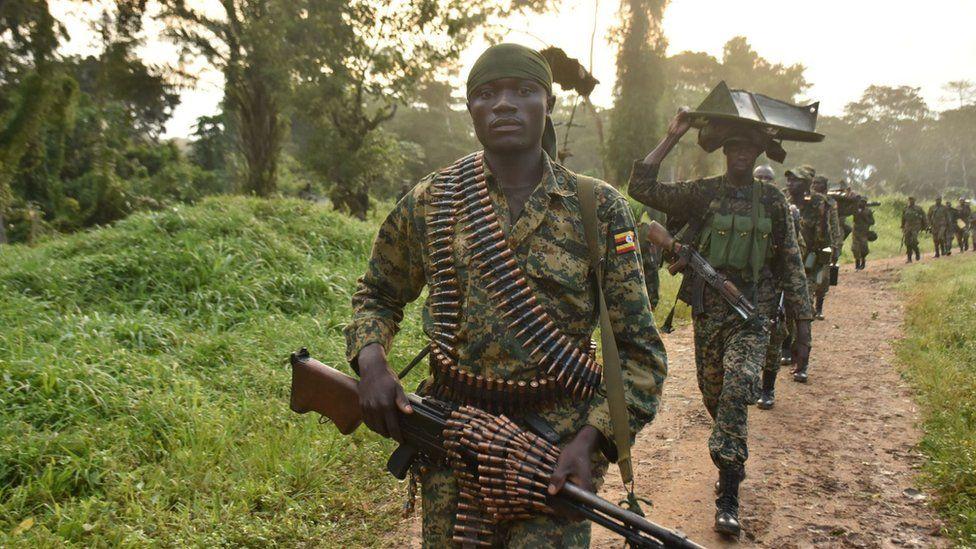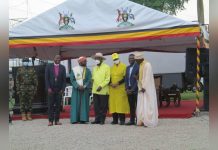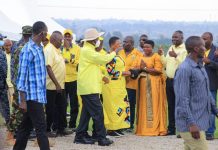By Faridah N Kulumba
Africa-Press – Uganda. The government of Uganda headed by President Yoweri Kaguta Museveni is in preparations to send 1,000 troops to the Democratic Republic of Congo (DRC) by the end of this month to join a regional force mandated to help end decades of instability.
The agreement
In April this year, heads of state from the East African Community (EAC) including Uganda, Rwanda, Kenya, Burundi, Tanzania, South Sudan, and DR Congo agreed to establish a joint force led by Kenya to help restore peace and stability in Congo’s volatile Borth Kivu, South Kivu, and Ituri provinces.
Mission to protect humanity
The regional force will battle the many rebel groups operating in DR Congo if they refuse to lay down their arms. The advance contingent from the Uganda People’s Defence Force (UPDF) including intelligence, medical and logistical teams have already reached the force’s headquarters in Goma.
Uganda is the third country to deploy troop
According to Uganda’s army spokesman Felix Kulayigye, Uganda will be the third country to deploy troops in DR Congo after contingents from Kenya and Burundi have arrived in the area. But their involvement has been opposed by some activist groups and officials because of Uganda’s role in the conflict in DR Congo.
Uganda’s effects on interference In Congo’s internal affairs
This will not be the first time Uganda will be interfering in DR Congo’s security affairs. Uganda first went to DR Congo in 1996 to support rebel groups fighting against the government of former President of Congo Joseph Desire Mobutu Sese Seko claiming that Congolese armed groups allied to his government were a threat to Uganda’s security.
After Mobutu was overthrown by his son Laurent Desire Kabira, the new president found himself in conflicts with his former allies, Uganda and Rwanda, whom he accused of supporting a planned coup. Kabira decided to expel all foreign forces including Uganda.
DR Congo sues Uganda
In 1999, DR Congo petitioned the ICJ accusing Uganda’s armed forces of destroying properties, lives, and natural resources when it invaded the country in 1998. DR Congo had asked for compensation of USD11bn but the judges dismissed several parts of the claim and decided on a far lower amount.
The judgment
In February this year, the United Nation’s highest court, ruled that Uganda should pay DR Cong USD225 million for loss of life, USD40 million for damage to property, and USD60 million for damage to natural resources. The ICJ ordered Uganda to compensate DRC USD325 million in five annual installments of USD65 million between 2022 and 2026, starting in September this year.
Paying compensation
On 1st September, the government of Uganda started payment of USD325 million (about Shs 1.23 trillion) compensation to the Democratic Republic of Congo (DRC). The country paid the first annual installment of USD65 million in reparation. The compensation is to be paid in five installments of USD65 million, starting on September 1st this year and every September 1st for the following years.
“Verdict not fair,” Uganda
The government of Uganda dismissed the ICJ verdict saying that it was not fair. Uganda’s Attorney General Kiryowa Kiwanuka said they were many troops from different countries involved in the DR Congo conflict, and questioned why Uganda’s UPDF was singled out. This conflict involved forces from nine African Countries, including Uganda, and Rwanda, which supported rebel groups in the mineral-rich east of the DRC.
Uganda – DR Congo other joint forces
Eastern Congo already hosts hundreds of Ugandan troops, deployed in November last year under a separate bilateral arrangement to help hunt down the Islamic State-allied group. The two nations launched a joint operation this month against the Allied Democratic Forces (ADF), an armed group allied with Islamic State.
The army conducted search operations in the wake of air and artillery strikes against suspected ADF bases in the forests of eastern Congo. Hundreds of Ugandan soldiers and dozens of armored vehicles crossed the border at Nobili.
According to Pierre Boisselet from Kivu Security Tracker, which monitors unrest in the region, the scale of Uganda’s deployment suggests was the largest foreign intervention in Congo in over a decade, apart from a U.N. peacekeeping operation.
Rebel groups in DR Congo
More than 120 armed groups are operating across large swathes of eastern Congo, including M23 rebels, which the government of DR Congo has repeatedly accused Rwanda of supporting, but Rwanda denied the accusations.
The M23 have staged a major offensive this year, seizing territory, forcing thousands of people from their homes, and sparking a diplomatic row between DR Congo and Rwanda. The M23 rebels, largely Congolese Tutsi militia, have seized swaths of territory across North Kivu province, edging toward the region’s main city of Goma.
For More News And Analysis About Uganda Follow Africa-Press






